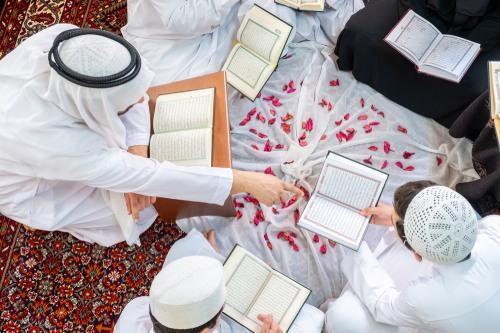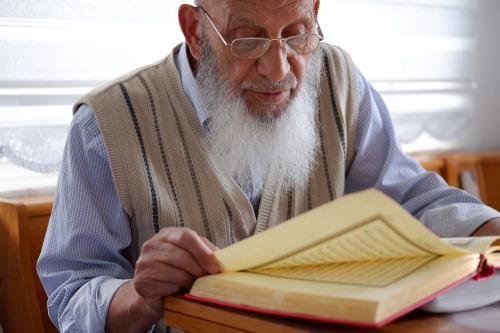
15 March, 2023
Tajweed is the set of rules and guidelines that govern the proper pronunciation and recitation of the Quran.
It is an essential aspect of Quranic studies and is considered to be one of the most important sciences of the Quran.
Tajweed is the set of rules and guidelines that govern the proper pronunciation and recitation of the Quran.
It is an essential aspect of Quranic studies and is considered to be one of the most important sciences of the Quran.
The word Tajweed comes from the Arabic root "j-w-d" which means to make something better or improve it.
Tajweed is the application of rules that aim to improve the recitation of the Quran, making it more beautiful and clear.
The rules of Tajweed cover a range of aspects of Quranic recitation, including proper pronunciation of Arabic letters and words, correct use of stops and pauses, and emphasis on certain words and phrases.
For example, the proper pronunciation of Arabic letters involves paying attention to their articulation, such as the difference between the letters "ba" and "ta", which have similar sounds but different pronunciations.

The rules of Tajweed are based on the way the Prophet Muhammad and his companions recited the Quran.
The Prophet Muhammad himself was known for his beautiful and melodious recitation of the Quran, and his companions learned from him and passed down their knowledge to subsequent generations.
Tajweed is considered to be an essential aspect of Quranic studies, as it ensures that the Quran is recited in the way that it was revealed to the Prophet Muhammad.
It also helps to convey the meaning and beauty of the Quran, enhancing the spiritual experience of those who recite it.
There are many resources available for those who wish to learn Tajweed,
including books, online courses, and classes at Islamic schools and institutions.
It is recommended that those who wish to learn Tajweed do so under the guidance of a qualified teacher, to ensure proper understanding and application of the rules.
So, here at Itqan Academy, we guarantee that you will find what do seek from very qualified male and female teachers who have Ijaza in the Tajweed and Qiraat (modes of recitations of the Quran).
Read More:The importance of learning Tajweed
For non-Arabic speakers, learning Tajweed is essential for properly reciting the Quran. Tajweed refers to the set of rules that govern the pronunciation of Arabic letters, their articulation points, and the correct sounds associated with them.
Even though Arabic may not be the first language for many, Tajweed allows non-Arabic speakers to recite the Quran with accuracy and respect for its sacred text.
The importance of Tajweed for non-Arabic speakers cannot be overstated.
By learning Tajweed, individuals can ensure that they are reciting the Quran as it was intended by its revelation, preserving the divine sounds and meanings.
This level of accuracy not only enhances the recitation but also deepens the understanding of the Quranic verses.
Tajweed helps distinguish between subtle sounds that can change meanings, which is especially important in preserving the integrity of the message.
For non-Arabic speakers starting their journey with Tajweed, it’s helpful to begin with the basic rules. These include mastering the Arabic alphabet, learning the correct articulation points of letters, and understanding the rules of elongation, nasalization, and pauses.
There are many resources, such as online courses, books, and teachers who specialize in teaching Tajweed to non-Arabic speakers.
One effective approach is to break down the recitation into manageable sections and practice consistently. Patience and repetition are key in this process, as mastery of Tajweed can take time but is ultimately rewarding.
The Adhan and Iqama are both important Islamic calls to prayer, yet they are recited differently in terms of Tajweed. While they share similar phrases, there are notable differences in how they are delivered, particularly in tone, length, and emphasis.
The Adhan, the call to prayer, is recited with a slightly longer duration and more melodious tone. This serves to announce the prayer time in a way that captures the attention of the community, inviting them to come to the mosque for prayer. In Tajweed, the Adhan requires particular attention to the elongation of certain vowels, allowing for a harmonious flow and clear enunciation of the words.
On the other hand, the Iqama, which is recited just before the prayer begins, has a more concise and direct tone. It is meant to signify that the prayer is about to start, and as such, its recitation is quicker and slightly more clipped compared to the Adhan. While the words in the Iqama are similar to those in the Adhan, the rules of Tajweed require a faster pace, with less elongation of vowels.
Both the Adhan and Iqama must follow the rules of Tajweed to ensure the proper pronunciation of each word. Any deviation in recitation can lead to misunderstanding or incorrect pronunciation. Therefore, mastering the "adhan and iqama difference tajweed" is crucial for anyone wishing to recite these calls with accuracy and respect.
By understanding these differences in Tajweed, individuals can appreciate the significance of the Adhan and Iqama and perform them correctly, preserving the beauty and precision of the Islamic ritual.
Book your free trial now:👇
https://api.whatsapp.com/send?phone=+201227545423&text=Salam%20ITQAN%20Academy
In conclusion, Tajweed is the set of rules and guidelines that govern the proper pronunciation and recitation of the Quran.
It is an essential aspect of Quranic studies and is based on the way the Prophet Muhammad and his companions recited the Quran.
Tajweed ensures that the Quran is recited in the way that it was revealed, conveying its meaning and beauty and enhancing the spiritual experience of those who recite it.
Our academy, (Itqan Academy), is the best online platform for teaching Tajweed with very qualified teachers who are graduated of Alazhar University and Arabic speakers.

